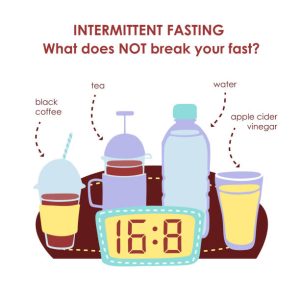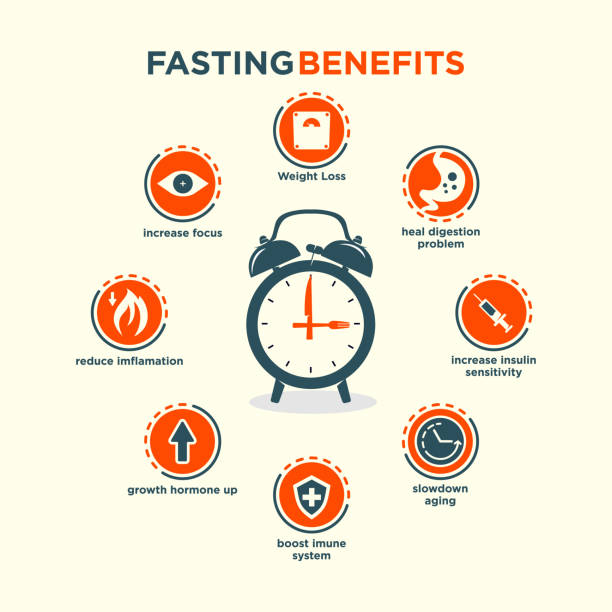Table of Contents
ToggleI’m a man. I eat food. And I like it! But on occasion, maybe once or twice a week, I feel the need to do something different to get that extra boost of energy and focus that you can’t get from eating pizza. So when this happens, I turn to intermittent fasting for men—and it works like a charm every time.
What is Intermittent Fasting?
Intermittent fasting is a dietary approach that involves cycling between periods of eating and fasting. This method has gained significant attention in recent years due to its potential health benefits and weight management advantages.
Brief History and Origins of Intermittent Fasting
The origins of intermittent fasting can be traced back to ancient civilizations, where fasting was practiced for religious or spiritual purposes. However, it has evolved and gained recognition as a viable approach for overall well-being and weight control.
Why Intermittent Fasting has Gained Popularity Among Men
Intermittent fasting has particularly gained popularity among men due to its simplicity and effectiveness. Men are often drawn to the idea of optimizing their physical performance and achieving a lean physique. Additionally, intermittent fasting aligns well with busy schedules and can be easily incorporated into their daily routines. With its ability to improve insulin sensitivity, boost metabolism, and promote fat burning, intermittent fasting has become a go-to method for many men seeking to improve their health and achieve their fitness goals.

Understanding the Science Behind Intermittent Fasting
Impact on Insulin Levels
Intermittent fasting has a significant impact on insulin levels. During fasting periods, the body’s insulin production decreases, leading to improved insulin sensitivity. This allows for better regulation of blood sugar levels, potentially reducing the risk of insulin resistance and type 2 diabetes.
Benefits of Autophagy During Fasting
One of the intriguing benefits of intermittent fasting is the process of autophagy. Autophagy is the body’s cellular recycling system, where damaged or dysfunctional cells are broken down and removed. During fasting, the body enters a state of autophagy more readily, promoting cellular rejuvenation and potentially reducing the risk of age-related diseases.
Effects on Hormones, Including Testosterone
Hormones play a crucial role in the body’s response to intermittent fasting. Research suggests that fasting can increase the production of human growth hormone (HGH), responsible for muscle growth and repair. Moreover, intermittent fasting has been linked to increased testosterone levels, a hormone essential for both men and women in maintaining muscle mass, bone density, and overall vitality.
Intermittent Fasting Methods: Exploring Different Approaches

16/8 Method: The Most Common Intermittent Fasting Protocol
The 16/8 Method is a widely adopted Intermittent Fasting approach. It involves fasting for 16 hours and restricting the eating window to 8 hours each day. By skipping breakfast and consuming all meals within a specific time frame, individuals can achieve regular daily fasting and potentially experience benefits like weight loss and improved metabolic health.
24-Hour Fasting: Alternate Day Fasting and Whole-Day Fasting
In this Intermittent Fasting method, individuals have two options: alternate-day fasting or whole-day fasting. Alternate-day fasting involves fasting every other day, while whole-day fasting requires abstaining from food for a full 24 hours. These approaches provide longer periods of fasting, encouraging fat-burning and potential weight loss.
5:2 Diet: Calorie Restriction on Two Non-consecutive Days
The 5:2 Diet involves calorie restriction on two non-consecutive days of the week, typically limiting intake to 500-600 calories. On the remaining five days, individuals can consume their regular amount of calories. This flexible approach can be more manageable for those who struggle with daily fasting, allowing them to achieve the benefits of Intermittent Fasting while still enjoying regular eating patterns most of the week.
Eat-Stop-Eat: 24-Hour Fasting Once or Twice a Week
Eat-Stop-Eat is an Intermittent Fasting method that involves fasting for 24 hours once or twice a week. This approach can be challenging for some individuals but offers the benefits of intermittent fasting while allowing regular eating patterns on non-fasting days. It provides a simple and straightforward way to incorporate fasting into a weekly routine.
Warrior Diet: Fasting During the Day, Feasting at Night
The Warrior Diet is inspired by ancient warrior cultures and follows a pattern of fasting during the day and feasting at night. During the fasting period, individuals typically consume a small amount of raw fruits and vegetables. The main meal is then consumed at night, focusing on nutrient-dense, whole foods. This method emphasizes the importance of timing and food choices during the feasting window.
Benefits of Intermittent Fasting for Men

Weight loss and body composition improvements
Intermittent fasting offers a powerful tool for men seeking weight loss and improvements in body composition. By restricting the eating window, intermittent fasting creates a calorie deficit, leading to fat-burning and overall weight reduction. It is effective in shedding stubborn belly fat and preserving muscle mass, resulting in a more toned and defined physique.
Improved insulin sensitivity and blood sugar control
Men who practice intermittent fasting may experience enhanced insulin sensitivity and better blood sugar control. This is crucial for preventing diabetes and managing weight-related health issues. By allowing the body to rest from constant food intake, intermittent fasting helps regulate blood glucose levels, reduces insulin resistance, and improves the body’s ability to utilize glucose efficiently.
Enhanced hormone production, including testosterone
Intermittent fasting has been found to have a positive impact on hormone production in men, particularly testosterone. Higher testosterone levels contribute to increased muscle mass, improved strength, and enhanced libido. This hormonal balance is essential for overall well-being and vitality.
Cognitive benefits and increased mental clarity
One of the remarkable benefits of intermittent fasting for men is its cognitive effects. Fasting has been shown to boost brain function, increase mental clarity, and enhance focus and concentration. These cognitive improvements can be particularly advantageous for men who lead busy and demanding lifestyles, enabling them to perform at their best mentally.
Anti-aging effects and improved longevity
Intermittent fasting has been linked to anti-aging effects and improved longevity. The practice triggers cellular repair mechanisms, reduces oxidative stress, and promotes autophagy, a process that clears out damaged cells. These effects help slow down the aging process, promote healthier aging, and potentially extend lifespan.
Potential for reducing the risk of chronic diseases
There is growing evidence suggesting that intermittent fasting may reduce the risk of chronic diseases. It has been associated with improved heart health, including lower blood pressure, cholesterol levels, and inflammation markers. Furthermore, intermittent fasting shows promise in reducing the risk of conditions such as type 2 diabetes, cancer, and neurodegenerative diseases.
Implementing Intermittent Fasting Safely and Effectively
Precautions for Men with Specific Health Conditions
Before embarking on an intermittent fasting journey, men with specific health conditions must take necessary precautions. Consulting with a healthcare professional is essential, especially for individuals with diabetes, hypoglycemia, or other metabolic disorders. These conditions can be affected by fasting, and medical guidance will help ensure safety and appropriate adjustments to fasting routines.
Establishing a Fasting Routine and Setting Realistic Goals
To implement intermittent fasting successfully, it is important to establish a fasting routine and set realistic goals. Starting with shorter fasting periods and gradually increasing the fasting window over time allows the body to adapt and minimize potential side effects. It is advisable to monitor the body’s response and adjust the fasting window accordingly.
Tips for Managing Hunger and Staying Consistent
Managing hunger and staying consistent during intermittent fasting can be challenging. However, there are strategies to help. Drinking plenty of water throughout the day can help curb hunger and keep the body hydrated. Consuming fiber-rich foods, healthy fats, and proteins during eating windows can promote satiety. Engaging in distractions such as hobbies or physical activities can also help take the mind off food and support consistency.
Combining Intermittent Fasting with Exercise and Fitness Goals
Integrating intermittent fasting with exercise and fitness goals can maximize the benefits. Exercising during the fasting period, such as engaging in light cardio or strength training, can help preserve muscle mass and promote fat burning. However, it is important to listen to the body and adjust the intensity and duration of workouts accordingly. Finding a balance between fasting and exercise is key to maintaining energy levels and preventing overexertion.
Meal Planning and Making Healthy Food Choices
Meal planning and making healthy food choices play a vital role in a successful intermittent fasting journey. Prioritizing whole, nutrient-dense foods such as fruits, vegetables, lean proteins, and whole grains is crucial. Avoiding processed and sugary options is important to optimize the benefits of fasting and support overall health. Planning meals ahead of time can also help maintain consistency and prevent impulsive food choices.
Combining Intermittent Fasting with Other Lifestyle Factors
Sleep and Stress Management
Prioritizing Restful Sleep: Getting sufficient sleep is essential for supporting intermittent fasting. Adequate rest allows the body to recover and rejuvenate, promoting overall well-being. By prioritizing restful sleep, individuals can optimize their energy levels and mental clarity, which can positively impact their fasting experience.
Managing Stress Levels for Optimal Results: High levels of stress can negatively affect both sleep quality and fasting outcomes. Therefore, it is crucial to implement effective stress management strategies. Engaging in activities like exercise, meditation, and relaxation techniques can help reduce stress levels, allowing individuals to better adhere to their fasting routine and experience improved results.
Importance of Hydration and Water Intake
Staying Hydrated Throughout the Day: Proper hydration is essential for overall health and well-being, especially during intermittent fasting. Drinking an adequate amount of water throughout the day helps maintain proper bodily functions, aids digestion, and supports the fasting process. It is important to ensure sufficient hydration during both fasting and non-fasting periods.
Benefits of Proper Hydration for Fasting Success: Proper hydration has numerous benefits when combined with intermittent fasting. It helps curb hunger pangs, keeps the body energized, and assists in flushing out toxins. Additionally, staying well-hydrated promotes healthy skin, supports cognitive function, and aids in weight management, all of which contribute to the success of intermittent fasting.
Incorporating Mindfulness and Meditation Practices
Cultivating Awareness and Focus: Mindfulness and meditation practices can significantly enhance the benefits of intermittent fasting. By engaging in these practices, individuals can develop a heightened sense of awareness of their body’s needs, including hunger and satiety cues. This awareness helps them make conscious decisions about their food intake and maintain self-discipline during fasting periods.
Reducing Stress and Enhancing Fasting Experience: Mindfulness and meditation techniques are powerful tools for reducing stress levels. They promote relaxation, increase resilience to stress, and improve mental well-being. By incorporating these practices into their daily routine, individuals can create a positive mindset, reduce emotional eating tendencies, and enhance the overall fasting experience.
Maintaining a Balanced and Nutritious Diet outside of Fasting Periods
The Importance of a Healthy Diet: Intermittent fasting should not be viewed as a license to consume unhealthy foods during non-fasting periods. It is essential to maintain a balanced and nutritious diet to support overall health and complement the benefits of fasting. Consuming a variety of whole foods, such as fruits, vegetables, lean proteins, and healthy fats, ensures the body receives the necessary nutrients for optimal well-being.
Nutrient-Rich Foods for Overall Well-being: Incorporating nutrient-rich foods into the diet is vital for maximizing the benefits of intermittent fasting. These foods provide essential vitamins, minerals, and antioxidants that support the body’s functions, boost the immune system, and promote overall well-being. By making healthy food choices outside of fasting periods, individuals can further optimize their fasting results and maintain a sustainable lifestyle.











